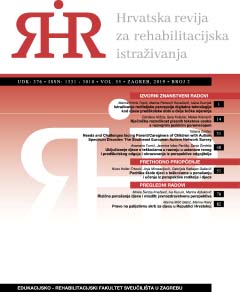PODRŠKA ŠKOLE DJECI S TEŠKOĆAMA U PONAŠANJU I U UČENJU IZ PERSPEKTIVE RODITELJA I DJECE
SCHOOL SUPPORT FOR CHILDREN WITH LEARNING AND BEHAVIOUR DIFFICULTIES, FROM THE PERSPECTIVE
OF THE CHILDREN AND THEIR PARENTS
Author(s): Nivex Koller-Trbović, Anja Mirosavljević, Gabrijela Ratkajec GaševićSubject(s): Family and social welfare, Inclusive Education / Inclusion
Published by: Sveučilište u Zagrebu, Edukacijsko-rehabilitacijski fakultet
Keywords: children with learning and behaviour difficulties; school support; perspective of parents and children;
Summary/Abstract: The aim of this paper was to describe perceptions and experiences of school support for pupils with learning and behavioural difficulties from the perspective of parents and their children. lnterviews were conducted with 33 participants in 1O families at risk Inductive thematic analysis showed that the key topic was to explain how behaviour and learning difficulties unnoticed by the school progress to behaviour and learning problems and problems in the family environment. The results suggest that family members perceive school as extremely important in their value system, and that schooling is a key topic present throughout childhood, burdening children as well as parents. Behaviour/learning problems are evident .from the start of elementary school. To solve such problems, parents seek help first from school experts, and later from experts working in other services. From the parents' perspecitve, they find neither understanding nor help, and they feel that they are usually left to cope with problems on their own. Therefore, progression of problems and their spread into non-academic types of problems are evident. In cases where schools ensure some kind of interventions, the perspective of research participants is that they are not matched with the type or intensity of the child's needs. As experience from the research participants show, calls for help and assistance often come from parents, or even the children themselves. That means that it is unnecessary to motivate parents to participate in interventions, so the lack of school interest in providing support to parents and pupils is surprising. Possible school interventions that are focused on the needs of children with behaviour and learning difficulties are proposed in the discussion.
Journal: Hrvatska revija za rehabilitacijska istraživanja
- Issue Year: 55/2019
- Issue No: 2
- Page Range: 53-69
- Page Count: 17
- Language: Croatian

